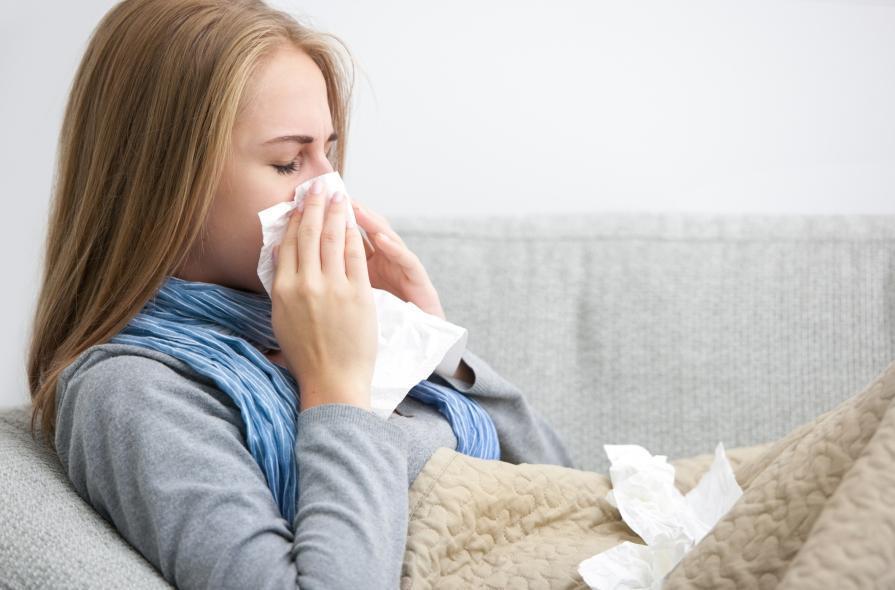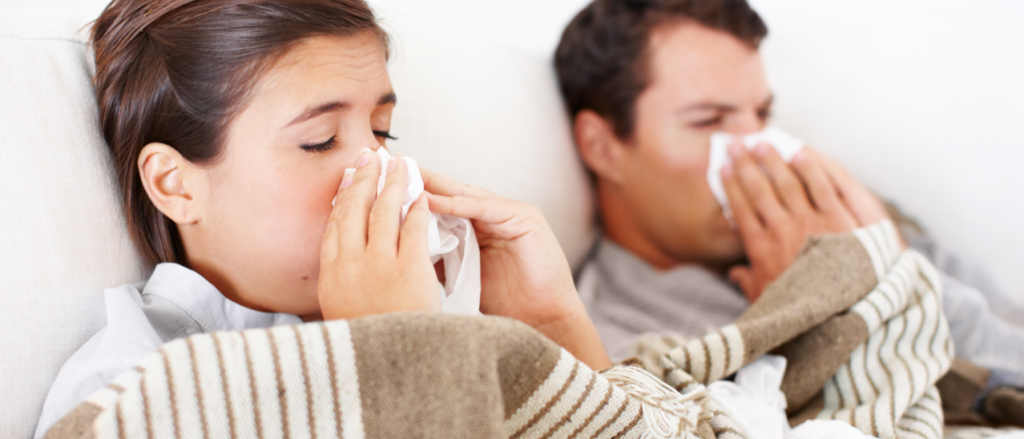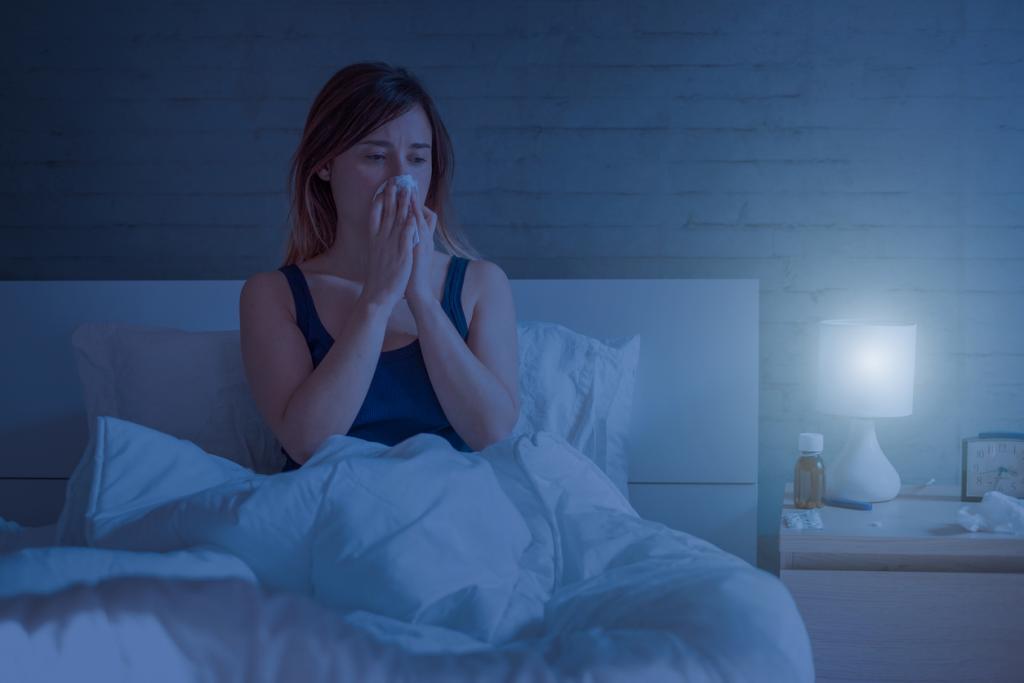When the beautiful azaleas, gardenias, and rose bushes begin to blossom, it might be a welcome sight, but it can also signal the beginning of allergy season. About 20 million adults in the United States have been diagnosed with seasonal allergic rhinitis (hay fever), according to the Centers for Disease Control and Prevention. Other than plants, there are many other types of allergies!
Sneezing, itchy eyes, nose, and throat, as well as a stuffy or runny nose, are all common symptoms of seasonal allergies. It might be difficult to deal with allergy symptoms while you’re up, and allergies can make it difficult to sleep at night. Allergy symptoms can cause sleep problems, which are common. Sleep deprivation can contribute to a lack of energy during the day. Even yet, don’t give up hope for allergy sufferers; there are solutions out there! Allergies can have a negative impact on your sleep, so we’ll look at some strategies to help you sleep better and live a healthier life.

Here are some ways to help you get the sleep you need to deal with allergies:
- Consider purchasing an air purifier. An air purifier can help people sleep better at night, regardless of whether they have allergies or not.
- Pollen season is a good time to be extra cautious about opening and closing your windows and doors. When pollen counts are high, keeping windows closed and turning on the air conditioner in the house or car can help allergy sufferers.
- Talk to your doctor about drug choices. A visit to your doctor is highly recommended if you want to learn more about your allergies and the best course of action to take to alleviate your symptoms.
Types of Allergies
Many factors, like what you’re allergic to, where you live, and the season, influence how allergies impact you. Seasonal allergies can be a problem for many people. Seasonal allergies are most common in the spring, summer, and early fall in the United States, due to pollens or mold spores, respectively, in these seasons. Perennial allergies, on the other hand, may be caused by an allergy to dust mites. Allergies to dust mites or cat dander are more common if they are chronic rather than seasonal. As a result, these can cause difficulty falling or staying asleep.
Allergies and Sleep Issues
When you’re awake or asleep, your life might be ruined by allergy symptoms. Allergy sufferers frequently have trouble falling asleep. Allergies can disrupt sleep by irritating nasal passages, which can make it more difficult to breathe. Allergies themselves can also be a sleep disruptor. Allergy symptoms, such as stuffy nose and itchy eyes, tend to get worse at night. The quality and quantity of sleep you get can have a significant impact on your quality of life, such as your ability to enjoy daily activities or be productive at work or school.
As a result of allergies, you may find yourself exhausted on a daily basis. Sneezing and coughing all night, or having problems breathing while you sleep, might make you feel exhausted. These signs can keep you up at night and make you feel weary all day, as well as making you feel generally ill. People with allergic rhinitis took longer to fall asleep, slept for less hours at night, and felt sleepier throughout the day, according to a study on the subject. Alcohol and sedatives were more popular amongst them as well. They experienced poorer sleep, which had a negative impact on their overall well-being.
So, what can you do to get rid of those bothersome allergies and improve your quality of life in terms of rest and well-being?
What are the Most Common Allergies That Affect Sleep?
Seasonal or year-round allergens may be present at night, depending on where you live, and the severity of these allergies can vary. Dust mites, pollen, mold, pets, and cockroaches are the most prevalent offenders.
Dust Mites
One of the most common6 and earliest allergens to appear in young children7 is dust mites. Mattresses, pillows, and box springs are common places to find these critters, which feed on dead skin cells. Allergy reactions to dust mites8 can occur at any time of the year since they are caused by a buildup of dust.

Dust mite allergies can be managed by replacing bedding and other items that collect dust. Dust can accumulate in both feather and synthetic cushions, despite popular belief.9 Consider purchasing a sealable cover10 for your new pillow and mattress to help keep dust mites out of your bedding.
Stuffed animals and stuffed animals are all potential places for dust to build up. They should be thoroughly cleaned or replaced with sterile alternatives like laminate or hardwood floors and blinds.
Dusting your home on a regular basis can help keep dust mites at bay. Vacuums, air conditioners, and heaters all have filters that should be checked and cleaned or replaced as needed. A dehumidifier or a HEPA filter can help minimize the amount of airborne dust, as they can with many other allergens.
Pollen
Some people have an allergy to pollen from plants such as trees and grasses, such as ragweed. In general, pollen allergies are seasonal, with the worst symptoms occurring in the spring, late summer, and early fall, depending on the plant in question.
When the weather is hot and dry, hay fever tends to get worse. Avoid going outside on days when the pollen count is high, especially in the morning. You may check the pollen count in your location online, on television, or on the radio, depending on the source.
You may reduce the amount of pollen in your home by locking doors and windows, washing your clothing inside rather than outside, and taking a shower before going to sleep.
Mold
Allergies to mold spores13 often seasonal, since mold thrives in cold, moist conditions. Reducing the amount of moisture in your home is the greatest approach to keep mold at bay.
After taking a shower or bath, bathrooms should be properly ventilated. By wiping down damp surfaces and fully extending the shower curtain, you can assist prevent mold from forming if you do not have access to a fan or window. Turning up the heat or putting in a dehumidifier may also help.
Mold needs to be removed as soon as it emerges to prevent allergies. Mold can grow on a variety of surfaces, including faucets, sinks, shower curtains, refrigerator trays, dish racks, carpets, and even stuffed animals and books. Towels and clothing that have not been properly dried might also emit a musty odor.
Pet Dander
The dander14 from the skin and saliva of family dogs is one of the most aggravating allergens for many individuals. In the United States, this is, unfortunately, one of the most frequent year-round allergy 15.
The risk of nighttime allergy problems increases for those who sleep with their pets, so consider purchasing a separate bed for your four-legged friend. Avoid petting your pet’s face, rubbing your eyes after petting them, and washing your hands after since direct contact with pet dander can induce the most severe reactions.
Allergic people with pollen sensitivity should be aware that pets can bring in more outside allergens from time to time, even if pet allergies are year-round. Giving your pet non-allergenic shampoo baths on a regular basis can help lessen the amount of indoor allergens.
Allergies to certain pets are more severe than those to others. Although even hypoallergenic16 breeds of dog and cat can shed allergies, some people have better luck with a hairless cat. Before bringing a new pet into your home, it may be a good idea to conduct a trial run.
Cockroaches
Cockroach proteins17 have been linked to hay fever-like symptoms in some persons. Despite the cockroach’s death, the proteins are still present in the body, saliva, and even the feces, and can still cause allergies.
These pests can be kept out of your house with proper hygiene. Regular cleaning, aerating wet areas and sealing garbage cans and food sources are the greatest ways to ensure that your home is free of pests.
Household Products and Cigarette Smoke
Even while rhinitis symptoms have been connected to cigarette smoke and other common home cleaners with strong odors, the mechanism may not be due to allergic sensitization, as is the case with the allergens indicated above.

Reduce your exposure to these odors by using unscented soap and cleaning products and asking smokers to smoke outside or near a window.
Talk Your Doctor
It’s a good idea to make an appointment with your doctor to discuss your allergies if you haven’t done so recently. This will allow your doctor to diagnose your allergies and choose the best course of therapy. Antihistamines and other over-the-counter drugs may be all that’s needed in some cases. If your child has allergies, talk to their doctor before giving them any prescriptions. Some medications aren’t suitable for youngsters.
Reduce Pollen and Dander Exposure
Allergy sufferers benefit greatly from making a few alterations to their way of life. For example, some allergy sufferers find that closing windows and turning on air conditioning when pollen counts are high helps their symptoms. For some pet owners, having their animals sleep in a separate room helps alleviate their allergy symptoms. Rather than having your pet sleep in your bedroom, if this is an issue for you, you might want to create a separate sleeping space for him. In addition, keeping pets out of your bedroom during the daytime can lessen the amount of pet hair and dander in your home. The allergens that can irritate the eyes and nose can be prevented by washing your hands after touching your pet. Showering before going to bed can help you get a better night’s sleep by eliminating pollen and dander from your hair and skin. For those who suffer from pet allergies, an air purifier may be a good investment.
Clean the Air for Better Sleep
An air purifier can help people sleep better at night, regardless of whether they have allergies or not. Allergies to various pollution exposures have been shown to worsen. Dust mites, mold, and pet dander are all common allergens. In bedding, such as sheets, pillows, and mattresses, several allergens may be present. Pollen can be found indoors and outdoors, and some pollen kinds are more prevalent at night than during the day. Allergies can be lessened when sleeping if these particles are removed from the air by an air purifier.
A sort of sound known as pink noise is emitted by some air purifiers, such as the Alen BreatheSmart range, which can help people sleep better. In two separate trials done by SleepScore Labs, the Alen BreatheSmart 45i was found to improve sleep, particularly among those who reported poorer sleep quality. First, 96 percent of the participants claimed that using the Alen air purifier reduced their allergy symptoms, and 93 percent reported that the Alen air purifier enhanced their sleep. In the second trial, participants who used an air purifier in their bedroom reported significantly better sleep quality than those who didn’t use the purifier.
Each allergy condition is unique, thus a variety of approaches and treatments are often required. In order to find out what works best for you, you may have to go through some trial and error. While allergies can definitely affect your sleep, you can begin taking actions immediately to reduce your allergies and obtain the sleep that your body needs if you stay proactive and contact your health care practitioner.
Why Are My Allergies Worse at Night?
An itchy, runny nose, watery eyes, and sneezing are just some of the uncomfortable symptoms that people with allergies experience when they are exposed to “trigger” chemicals such as cat dander or dust mites. All of these typical allergens can be found in the bedroom and on our pillows and blankets. Allergy sufferers’ symptoms are exacerbated when dust mites and pet dander are found in their pillows and bedspreads. Bedding, including pillows, should be washed periodically to avoid this.
Congestion in the nose tends to get worse at night, and some allergy treatments might make it difficult to sleep. With allergies, people typically suffer from sleeplessness, midnight awakenings, and daily drowsiness. As a result, they’re also at risk for problems like as overnight awakenings5 and sleep-related breathing difficulties.
What do you think of this article?

![Top Rated CPAP Machine Buyer’s Guide [current_date format=’m/Y’]](https://bestpillowsleepers.com/wp-content/uploads/2023/03/best-cpap-machine-img_6405d72310053-400x300.jpg)
![The 11 Best Cooling Weighted Blankets [current_date format=’m/Y’]](https://bestpillowsleepers.com/wp-content/uploads/2023/01/best-cooling-weighted-blankets-img_63d4ff15c615d-400x300.jpg)
![Ultimate Guide to Choosing a Best Cooling Mattress Pads [current_date format=’m/Y’]](https://bestpillowsleepers.com/wp-content/uploads/2023/01/best-cooling-mattress-pads-img_63c403115126b-400x300.jpg)
![Ultimate Guide to Choosing a Best Cooling Mattress [current_date format=’m/Y’]](https://bestpillowsleepers.com/wp-content/uploads/2023/01/ultimate-guide-to-choosing-a-best-cooling-mattress-img_63bcdba870d77-400x300.jpg)
![Ultimate Guide to Choosing a Best Cooling Comforters [current_date format=’m/Y’]](https://bestpillowsleepers.com/wp-content/uploads/2023/01/ultimate-guide-to-choosing-a-best-cooling-comforters-img_63bba2f5cd3ce-400x300.jpg)